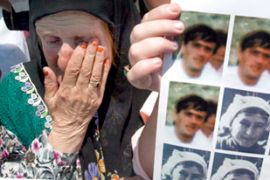Dutch in dock for Srebrenica crimes
Survivors and relatives sue Netherlands over “complicity” in massacre of Bosnians.

Published On 16 Jun 2008
Seeking justice
Hasan Nuhanovic, an interpreter with the United Nations, said that his father, mother and younger brother were killed after they were expelled from a Dutch military base in the town.
“Dutch battalion members in Srebrenica in the Dutch base expelled my family and handed them over to the Serbs. I saw it with my own eyes,” Nuhanovic said.
He was allowed to remain inside the base because he had a UN identity card, the court heard.
“If I had not done this, I would not be able to go on with my life. I am seeking justice,” Nuhanovic said ahead of the hearing.
The family of Rizo Mustafic, who died as an electrician in the Dutch battalion of the UN protection force in Srebrenica, is also suing the Dutch state in a separate case which opened on Monday.
Lawyers for the two argue the Dutch state allowed the killing of thousands of Bosnians.
“They [the survivors] finally have a chance to speak out. We have an extremely strong case. On a legal basis, I firmly believe we should win,” Liesbeth Zegveld, Nuhanovic’s lawyer, said.
The court will hear a separate suit on Wednesday filed by about 6,000 relatives of Srebrenica massacre victims against the Dutch state and the United Nations.
Dutch defence
Outside the court, about 50 relatives and Srebrenica survivors along with the Society for Threatened Peoples, a human rights group, kept a silent vigil, holding up a long banner inscribed with the names of the 8,106 victims.
The Netherlands has said its troops were abandoned by the United Nations which gave them no air support.
Public documents show a network of Dutch military officials within the United nations blocked air support because they feared their soldiers could be hit by “friendly fire”, the families’ lawyers have said.
Radovan Karadzic, the former Bosnian Serb leader and Mladic, both wanted by the UN war crimes tribunal in the Hague on genocide charges over Srebrenica, are still at large.
The Dutch government, led by Wim Kok, resigned in 2002 after a report on the massacre blamed politicians for sending the Dutch UN troops on an impossible mission.
Source: News Agencies